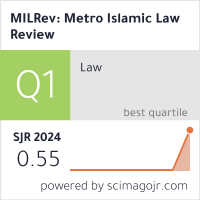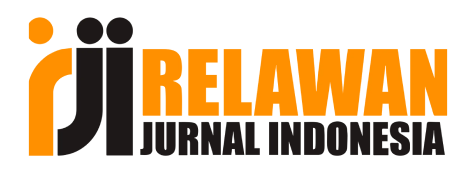Integrating Maqasid al-Shari’ah in Contemporary Islamic Legal Reform on Drug Policy
DOI:
https://doi.org/10.32332/milrev.v4i1.10665Keywords:
Drug Policy, Harm Reduction, Islamic legal Reform, Maqasid al-Shari’ah, Rehabilitation.Abstract
This research explores how contemporary Islamic legal reform shapes drug policy using the framework of Maqasid al-Shari’ah. In many Muslim-majority countries, drug-related problems are on the rise, and traditional punitive responses—such as mandatory death sentences and corporal punishment—are increasingly questioned for being ineffective and misaligned with core Islamic values. Using a qualitative-normative approach combined with comparative analysis, this study examines statutory frameworks, fatwas, and recent legal reforms in countries like Malaysia, Indonesia, and Iran. It highlights a growing shift toward maqasid-based reasoning in designing more balanced and humane drug policies. The findings reveal three key trends. First, there is increasing emphasis on hifz al-nafs (protection of life) and hifz al-‘aql (protection of intellect), reframing drug offences not merely as moral or legal violations but as public health concerns requiring systemic solutions. Second, several Islamic legal institutions are adopting harm reduction strategies—such as rehabilitation, decriminalisation of minor drug use, and reintegration programs—framed within the maqasid discourse to uphold human dignity and promote social welfare (maslahah ‘ammah). Third, there is a growing openness toward contextual ijtihad, allowing reinterpretation of hudud and ta'zir punishments considering contemporary realities and scientific evidence. Academically, this research contributes to Islamic legal studies by offering a systematic and comparative analysis of how the principles of Maqasid al-Shari’ah are being operationalised in modern drug policy reform. It fills a gap in the literature by bridging classical Islamic legal theory with contemporary policy needs, particularly in areas often neglected by traditional fiqh discourse, such as drug rehabilitation and public health. The study also advances the methodological integration of maqasid-based reasoning with empirical policy analysis, providing a practical framework for future legal reforms in Muslim-majority contexts.
Downloads
References
Abdullah, Muhammad Najib, dan Intan Nadiah Mahraji. "The Use Of Cannabis For Medical Treatment In Malaysia: An Analytical Study From The Fiqh Al-Muwazanat Perspective." Al-Qanatir: International Journal of Islamic Studies 33, no. 6 (14 November 2024): 277–292.
Abidin, M. Saiful Amri Zainal, M. Zohdi M. Amin, Abdulloh Salaeh, W. Fatimah Zahra’ W. Yusoff, dan Salmah Fa’atin. "The Practice of Islamic Psychospiritual Therapy in the Treatment of Drug Addiction at Rehabilitation Centres in Malaysia." Afkar: Jurnal Akidah Dan Pemikiran Islam 24, no. 2 (31 Desember 2022): 143–168. https://doi.org/10.22452/afkar.vol24no2.4.
Ahmed, Asadulla Shafee, dan Zuraini Ab Hamid. "Islamic Concept Of Drugs And Rehabilitation: Its Compatibility With Maldivian Legal Framework." Al-Qanatir: International Journal of Islamic Studies 32, no. 1 (1 Oktober 2023): 43–57.
Alam-Mehrjerdi, Zahra, Mohammad Abdollahi, Peter Higgs, dan Kate Dolan. "Drug Use Treatment and Harm Reduction Programs in Iran: A Unique Model of Health in the Most Populated Persian Gulf Country." Asian Journal of Psychiatry 16 (Agustus 2015): 78–83. https://doi.org/10.1016/j.ajp.2015.06.002.
Amanda, Niken Dwi, Merry Kurniawati Nurdin, Cinta Rizqareka Darmawan, Hilyah Az Zahra, Ananda Ratu Mawaddah, Setyo Nugraha, dan Mulyadi M. “Analisis Penanganan Kasus Narkoba Ditinjau Dari Perspektif Hukum Dan Masyarakat.” Media Hukum Indonesia (MHI) 2, no. 2 (27 Mei 2024): 249–258. https://doi.org/10.5281/zenodo.11318606.
Analisa, Lisa, Kamarusdiana Kamarusdiana, dan Nurul Adhha. "Implementation of Rehabilitation for Narcotics Addicts in Positive Legal Perspective and Islamic Law." Al-Risalah: Forum Kajian Hukum Dan Sosial Kemasyarakatan 22, no. 1 (30 Juni 2022): 92–124. https://doi.org/10.30631/alrisalah.v22i1.1122.
Andriyani, Andriyani, dan Rusmala Dewi. "Rehabilitation Sanctions Against the Narcotics User According to the Perspective of Maqashid Shariah." Nurani 20, no. 2 (1 Desember 2020): 233–246. https://doi.org/10.19109/nurani.v20i2.6926.
Asa’ari, Asa’ari, Zufriani Zufriani, Arzam Arzam, dan Doli Witro. “Urgensi Pemahaman Terhadap Maqashid Al-Syari’ah Dan Perubahan Sosial Dalam Istinbath Al-Ahkam.” De Jure: Jurnal Hukum Dan Syar’iah 13, no. 2 (31 Desember 2021): 222–239. https://doi.org/10.18860/j-fsh.v13i2.13818.
Badilla, Nurul Widhanita Y. “Efektivitas Pidana Penjara Bagi Pecandu Narkotika Di Lingkungan Lembaga Pemasyarakatan Narkotika Kelas Iia Jayapura.” Jurnal Komunitas Yustisia 5, no. 2 (26 Agustus 2022): 603–710. https://doi.org/10.23887/jatayu.v5i2.51748.
Baharudin, Mohd Norbayusri, Mahadzirah Mohamad, dan Fazida Karim. "Drug-Abuse Inmates Maqasid Shariah Quality Of Life: A Conceptual Paper." Humanities & Social Sciences Reviews 8, no. 3 (29 Juni 2020): 1285–1294. https://doi.org/10.18510/hssr.2020.83131.
Bungin, Burhan. Analisis Data Penelitian Kualitatif. Jakarta: PT Raja Grafindo Persada, 2003.
Dahlan, Dahlan, Zahoor Ahmed, dan Sitta Saraya. "The Concept of Criminal Justice For Drug Abuse: A Legal Approach." Jurnal Hukum 41, no. 1 (1 Maret 2025): 55–72. https://doi.org/10.26532/jh.v41i1.43965.
Hamdan, Hamdan, dan Afnaini Afnaini. "Implementation Of Restorative Justice In Criminal Acts Of Narcotics And Of Illegal Drug Abuse In Indonesia." Fox Justi : Jurnal Ilmu Hukum 15, no. 01 (26 Desember 2024): 72–89.
Hartono, Teguh, Vadira Hanami, dan Fanniya Dyah Prameswari. "Drug Abuse Rehabilitation Policies in Indonesia: A Comparison with Vietnam, Australia and Portugal." Wacana Hukum 29, no. 2 (31 Oktober 2023): 163–180. https://doi.org/10.33061/wh.v29i2.9576.
Helaluddin, dan Hengki Wijaya. Analisis Data Kualitatif: Sebuah Tinjauan Teori & Praktik. Sekolah Tinggi Theologia Jaffray, 2019.
Ifandy, Teguh, dan Idaul Hasanah. “Maslahat (Benefits) in Fiqh Awlāwiyāt: A Comparison between Yūsuf al-Qarādhawī’s View and Abdus Salam Alī al-Karbulī’s.” Al-’Adalah 21, no. 1 (25 Juni 2024): 1–24. https://doi.org/10.24042/adalah.v21i1.21316.
Iriani, Dewi. “Kejahatan Narkoba: Penanggulangan, Pencegahan Dan Penerapan Hukuman Mati.” Justicia Islamica 12, no. 2 (2015). https://doi.org/10.21154/justicia.v12i2.331.
Kadir, Muh Awaluddin, Muh Shuhufi, dan Misbahuddin M. “Efek Jera Pemidanaan Dalam Hukum Islam Dan Penerapannya Di Indonesia.” Socius: Jurnal Penelitian Ilmu-Ilmu Sosial 1, no. 11 (5 Juli 2024). https://doi.org/10.5281/zenodo.12666985.
Khatib, Suansar. “Konsep Maqashid Al-Syari`Ah: Perbandingan Antara Pemikiran Al-Ghazali Dan Al-Syathibi.” Jurnal Ilmiah Mizani: Wacana Hukum, Ekonomi Dan Keagamaan 5, no. 1 (30 Desember 2018): 47–62. https://doi.org/10.29300/mzn.v5i1.1436.
Laksana, Andri Winjaya. “The Legal Position Of Islamic Boarding School (Pesantren) As A Rehabilitation Effort For Narcotics Abuse.” International Journal of Law Reconstruction 5, no. 2 (2021): 317–327. doi:https://doi.org/10.26532/IJLR.V5I2.17756.
Laksana, Andri Winjaya, Andri Winjaya Laksana, Hendro Widodo, Moh Aris Siswanto, H D Djunaedi, and Setiawan Widyoko. “Criticism of Legal Protection for Victims of Drug Abuse: The Disharmony in Legal Substance Regulation.” Legality : Jurnal Ilmiah Hukum 33, no. 1 (January 15, 2025): 93–109. doi:10.22219/LJIH.V33I1.36680.
Mahadir, Mahadir. “Penyalahgunaan Narkoba Dalam Perspektif Maqashid Syariah.” Brilliant: Journal of Islamic Economics and Finance 2, no. 1 (23 Juli 2024): 30–48.
Maimun, Maimun, Sanusi Sanusi, Erna Hayati, dan Ari Munazar. “Dampak Penyalahgunaan Narkoba Terdahap Perkembangan Moral Anak.” Antropocene : Jurnal Penelitian Ilmu Humaniora 3, no. 2 (28 Mei 2023): 59–67. https://doi.org/10.56393/antropocene.v3i2.1648.
Ma'rifah, Nurul. “Menggali Dan Menemukan Konsep Maqasid Syari’ah Dalam Pohon Ilmu Hukum Indonesia.” Istinbath : Jurnal Hukum 16, no. 2 (31 Desember 2019): 248–264. https://doi.org/10.32332/istinbath.v16i2.1707.
Mikroj, Mohamad, dan Adang Djumhur. “Restoratif Justice Sebagai Perwujudan Keadilan Dalam Prespektif Teori Kemaslahatan (Maqashid Al-Syari’ah).” TAHKIM 19, no. 2 (31 Desember 2023): 238–253. https://doi.org/10.33477/thk.v19i2.5164.
Mohamed, Mahmood Nazar, dan S. Marican. "Treatment and Rehabilitation of Substance Use Disorder: Significance of Islamic Input in Malaysia." International Journal of Human and Health Sciences (IJHHS) 2, no. 4 (29 Agustus 2018): 209–216. https://doi.org/10.31344/ijhhs.v2i4.57.
Mohd Nawawi, Nor Alia Aqilah, Othman ,Elza Azri, Mohd Nasir ,Fairuz, Abdullah ,Kamarul Amin, dan Mohd Norbayusri and Baharudin. "Drug addictions in Malaysia: a mini-review on drug types, rehabilitation centers, and therapeutic programs." Journal of Ethnicity in Substance Abuse 0, no. 0 (t.t.): 1–13. https://doi.org/10.1080/15332640.2024.2336495.
Pranoto, Heru, Adwani Adwani, Rizanizarli Rizanizarli, dan Mohd Gaussya. "Construction of Narcotics Law Against Narcotics Abusers in Perspective Justice." Khazanah Hukum 6, no. 2 (6 Agustus 2024): 145–158. https://doi.org/10.15575/kh.v6i2.37635.
Priyono, Adi. "Drug Abuse In The Perspective Of Islamic Law." International Journal Of Humanities Education and Social Sciences 2, no. 3 (3 Desember 2022). https://doi.org/10.55227/ijhess.v2i3.304.
Purnomo, Agus. “Hukuman Mati Bagi Tindak Pidana Narkoba di Indonesia: Perspektif Sosiologi Hukum.” De Jure: Jurnal Hukum dan Syar’iah 8, no. 1 (25 Juni 2016): 15–23. https://doi.org/10.18860/j-fsh.v8i1.3726.
Rahmadhani, dan Irsyam Risdawati. "Drug Use in Medical Perspective and Islamic Law." International Journal of Synergy in Law, Criminal, and Justice 1, no. 1 (11 Juli 2024): 29–36. https://doi.org/10.70321/ijslcj.v1i1.13.
Rakhman, Fedi Arif. “Penerapan Keadilan Restoratif Dalam Penanganan Penyalahguna & Pecandu Narkotika.” Jurnal Ilmu Hukum, Humaniora Dan Politik 4, no. 6 (13 September 2024): 2258–2267. https://doi.org/10.38035/jihhp.v4i6.2675.
Ramadhan, Rangga Abdi, Athifatul Wafiroh, dan Cecep Soleh Kurniawan. “Penerapan Hukuman Mati Di Indonesia Perspektif Maqasid al-Shari’ah.” Ma’mal: Jurnal Laboratorium Syariah Dan Hukum 5, no. 1 (2 Februari 2024): 27–49. https://doi.org/10.15642/mal.v5i1.198.
Riyansyah, Riyansyah, dan Sintong Arion Hutapea. “Efetivitas Restorative Justice Dalam Penyelesaian Kasus Penyalahgunaan Narkotika Di Indonesia.” Mahkamah : Jurnal Riset Ilmu Hukum 2, no. 2 (9 April 2025): 70–77. https://doi.org/10.62383/mahkamah.v2i2.566.
Rustiana, dan Dinny Wirawan Pratiwie. “Pembuktian Penyalahguna Narkotika Dalam Rangka Penerapan Asas Restorative Justice: (Studi Perkara Tindak Pidana Nomor: 396/Pid.Sus/2021/PN Smr).” Yuriska: Jurnal Ilmiah Hukum 14, no. 2 (25 Agustus 2022): 65–74. https://doi.org/10.24903/yrs.v14i2.1001.
Santoso, D. "Efforts to prevent drugs abuse among youth in islamic family law perspective." Journal of Drug and Alcohol Research 10, no. 8 (2021).
Shafiee, S. Ali, AbouAli Vedadhir, dan Emran Razaghi. "Ups and downs of addiction harm reduction in Iran: key insights and implications for harm reduction policy and policing." Harm Reduction Journal 20, no. 1 (20 Januari 2023): 8. https://doi.org/10.1186/s12954-022-00719-0.
Sibarani, Fauzi Anshari, dan Erwin Asmadi. "Harmonizing Law Enforcement Officials Against Child Victims of Narcotics Abuse." Justisi 10, no. 2 (1 Februari 2024): 328–340. https://doi.org/10.33506/js.v10i2.2834.
Siregar, Hapni Laila, Anggi Yulinda, Arisyah Dwi Fadhilah, dan Uly Anti Mawaddah. “Analisis Peran Agama Islam Dalam Menanggulangi Penyalahgunaan Narkoba Di Kalangan Remaja.” Madani: Jurnal Ilmiah Multidisiplin 2, no. 5 (5 Juni 2024). https://doi.org/10.5281/zenodo.11489278.
Taufek, Nor Hidayah Mohd, Syafiqah Nadiah Halimi, Norny Syafinaz Ab Rahman, Che Suraya Zin, Che Anuar Che Mohamad, dan Christopher John Turner. “Experiential Education as a Strategy to Preserve Maqasid Al-Shariah by Identifying and Addressing Stigmatic Views Held by Pharmacy Students of Patients with Substance Use Disorders.” Journal of Pharmacy 1, no. 1 (8 Januari 2021): 1–7. https://doi.org/10.31436/jop.v1i1.9.
Wanto, Deri, Rahmad Hidayat, dan R. Repelita. "Maqasid Shariah Change as Theory: From Classical to Cotemporary Maqasid Shariah." Al-Istinbath: Jurnal Hukum Islam 6, no. 2 November (11 November 2021): 427–454. https://doi.org/10.29240/jhi.v6i2.3122.
Winjaya, Andri, Laksana Universitas, Islam Sultan, and Agung Semarang. “The Legal Position of Islamic Boarding School (Pesantren) As A Rehabilitation Effort For Narcotics Abuse.” International Journal of Law Reconstruction 5, no. 2 (October 14, 2021): 317–327. doi:10.26532/IJLR.V5I2.17756.
Yahya, Faisal, dan Nida Ul Fadhila. "Addictive Drug Abusement by Underage Children in Blangkejeren Gayo Lues [Penyalahgunaan Zat Adiktif oleh Anak di Bawah Umur: Studi Kasus di Kecamatan Blangkejeren Kabupaten Gayo Lues]." Legitimasi: Jurnal Hukum Pidana dan Politik Hukum 9, no. 1 (28 Juni 2020): 17–45. https://doi.org/10.22373/legitimasi.v9i1.7325.
Zahari, Nur Aqila Mohd, dan Mohd Hafiz Safiai. "Maqasid Sharia and the Biomedical Ethics of E-Cigarettes: A Contemporary Islamic Legal Assessment." MILRev: Metro Islamic Law Review 4, no. 1 (30 Mei 2025): 295–318. https://doi.org/10.32332/milrev.v4i1.10398.
Zainuddin, Ahmad Za’im Rafiqin, dan Faudzinaim Badaruddin. “Drug Addiction Treatment in Malaysia: A Comparison: Rawatan Ketagihan Dadah Di Malaysia: Suatu Perbandingan.” Al-Qanatir: International Journal of Islamic Studies 9, no. 1 (2 Juli 2018): 27–34.
Zaki, Mohamad Muhaimin Mohamad, dan Jasni Sulong. "The Islamic Treatment For Drug Addict: A Case Study At Madrasah Anharol-Ulum, Thailand." European Proceedings of Social and Behavioural Sciences Role(s) and Relevance of Humanities for Sustainable Development (23 September 2019). https://doi.org/10.15405/epsbs.2019.09.37.
Zulfa, Eva Achjani. “Optimalisasi Pendekatan Restorative Justice terhadap Victimless Crime (Penyalahgunaan Narkoba) sebagai Solusi Lapas yang Over Kapasitas.” Jurnal Pendidikan Tambusai 6, no. 1 (28 April 2022). https://doi.org/10.31004/jptam.v6i1.3684.
Downloads
Published
Issue
Section
License
Copyright (c) 2025 Andri Winjaya Laksana, Muhammad Ridwan Lubis, Denny Suwondo, Muhammad Ngazis, Ratih Mega puspa sari

This work is licensed under a Creative Commons Attribution-ShareAlike 4.0 International License.










